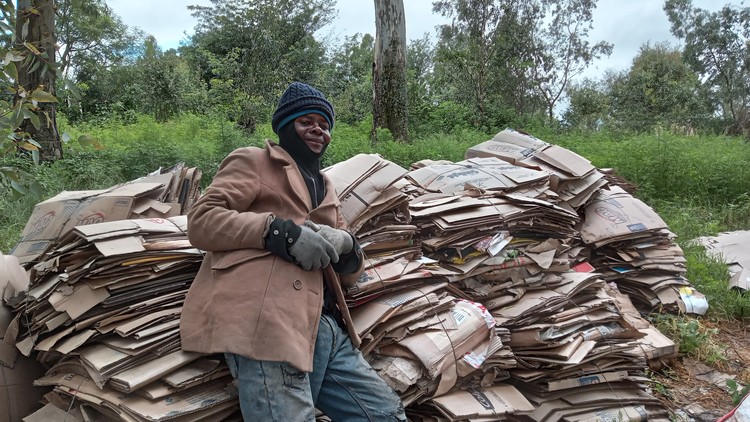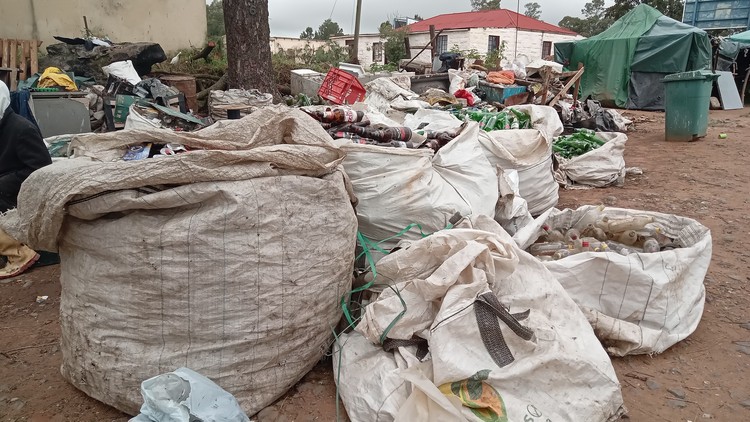Waste management project is changing lives in rural KwaZulu-Natal
Kenneth Shelembe says he makes a living wage through the Nquthu Waste Management Project
Kenneth Shelembe from Mahlungulu near Nondweni in rural KwaZulu-Natal says he has been able to make a living wage as a waste picker. Photos: Bongane Motaung
Kenneth Shelembe, a father of four from Mahlungulu in Nquthu, began making a living by sorting through recyclable waste in 2010.
Over the years, Shelembe has managed to save enough money to open a spaza shop and has bought a small plot in Boksburg in Gauteng, where he has built a family home.
He believes people often underestimate the important work done by waste pickers and recyclers. “We may look dirty but the money we make is changing our lives,” says Shelembe.
He was born and raised in a small KZN town, and moved to Gauteng as a young man in search of work to help support his single mother and siblings. He struggled to find work and eventually got into recycling.
Now Shelembe makes an average of about R14,000 per month selling recyclable material in bulk through the Nquthu Waste Management Project.
The project was initially set up by the Nquthu local municipality as a co-operative with the Belgian town of Bornem in 2008, to fund waste management, among other initiatives in mostly rural KZN. Through a grant from Bornem, the project formalises the sale of recyclables and provides opportunities for waste pickers to earn a living wage. The Nquthu and Bornem won second place in the European Union’s Platforma Awards 2020 with the “Waste for Employment” project.
From the money he has made from recycling, Shelembe has opened his own spaza shop and is trying his hand at farming. “I saw an opportunity at the Nquthu Waste Management Project. While the commission was lower compared to big cities, in a period of four months I made R50,000.”
Shelembe says he and other waste pickers took a knock in 2020 during the Covid lockdown. Then he had to take about six months off in 2021, when he was hospitalised for respiratory problems which doctors told him were caused by the dusty environment he works in daily.
Shelembe lives with other waste pickers at an informal site in the city centre where they sort through their material. He regularly returns to his family home.
Shelembe works with Thembani Xulu, who owns a company called JIBA which manages the Nquthu Waste Management Project. In 2022, his company received a R5-million grant from the Department of Forestry, Fisheries and the Environment.
Xulu told GroundUp that JIBA runs workshops for waste pickers and provides them with protective gear. Currently there are about 23 waste pickers working at the Nondweni dump site and 10 others stationed around town. Collectively they bring in about 30 to 40 tonnes of waste a month, he says.
The plastic, glass, cardboard and metal are sold to companies in Durban, Richards Bay and Mandeni near Stanger, says Xulu.
Some of the bags filled with plastic and glass bottles, and other reusable material, at the site where the waste pickers sort through their items.
Support independent journalism
Donate using Payfast

Don't miss out on the latest news
We respect your privacy, and promise we won't spam you.
Next: Gugulethu housing project delayed by extortion rackets
Previous: Over 100 learners squeeze into one room at this overcrowded school
© 2025 GroundUp. This article is licensed under a Creative Commons Attribution-NoDerivatives 4.0 International License.
You may republish this article, so long as you credit the authors and GroundUp, and do not change the text. Please include a link back to the original article.
We put an invisible pixel in the article so that we can count traffic to republishers. All analytics tools are solely on our servers. We do not give our logs to any third party. Logs are deleted after two weeks. We do not use any IP address identifying information except to count regional traffic. We are solely interested in counting hits, not tracking users. If you republish, please do not delete the invisible pixel.


